Nursing in Germany
July 30, 2025
•
7 Mistakes Nurses Make When Applying for Jobs Abroad — And How to Avoid Them
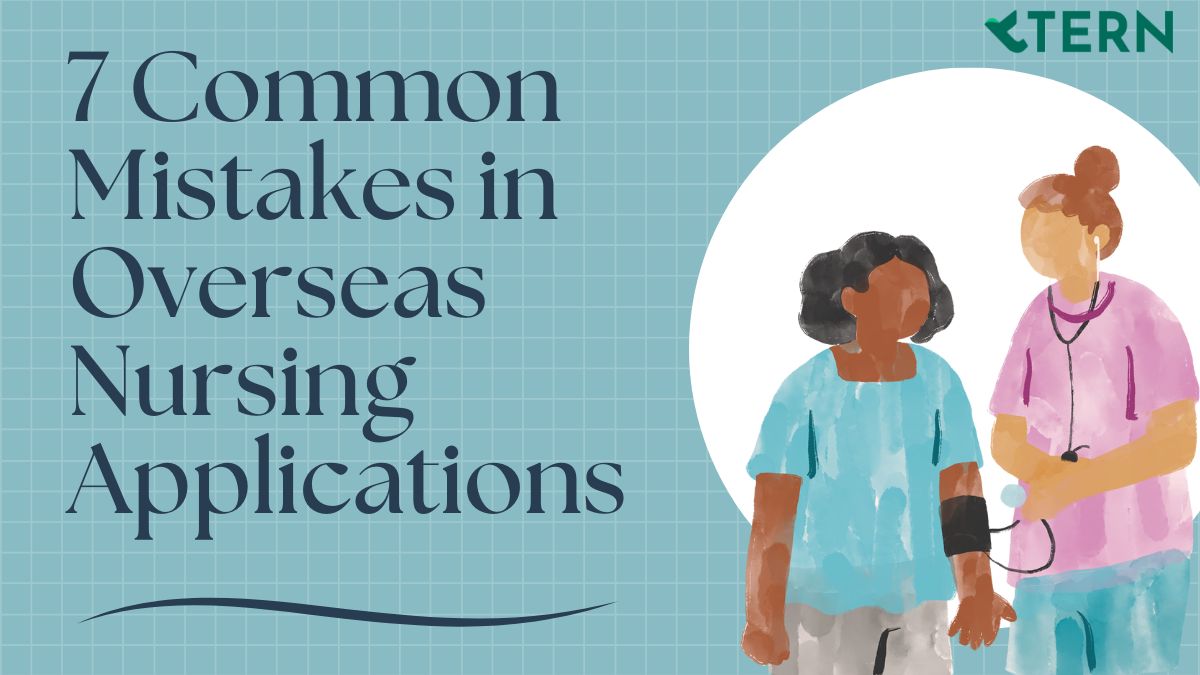
From missing documents to underestimating language prep, here’s what could cost you your dream job overseas.
The dream of working as a nurse abroad is more achievable than ever. With global demand for healthcare professionals soaring, countries like Germany, the UK, Australia, and Canada are rolling out the red carpet for qualified nurses. But the path isn’t as simple as submitting a resume and packing your bags. Many nurses stumble on silent dealbreakers that can delay or derail their plans.
In this post, we’ll uncover seven common mistakes nurses make when applying for jobs abroad — and share practical tips to help you avoid them. Whether you’re eyeing a role in a bustling European hospital or a serene rural clinic in New Zealand, these insights will keep you ahead of the curve.
1. Skipping Language Requirements or Misjudging Proficiency
Language proficiency is non-negotiable for nursing jobs abroad. Many nurses underestimate the level required or assume conversational skills will suffice. For example, Germany often requires a B2 level in German for nursing roles, while some countries accept B1 for initial applications but expect B2 later.
The Mistake: Not preparing for professional medical vocabulary or misunderstanding language certifications. A B1 certificate might get your foot in the door, but without B2-level fluency in patient interactions, you risk job rejection or workplace struggles.
How to Avoid It:
- Research the specific language requirements for your target country. Our guide on B1 vs. B2 language levels breaks it down.
- Enroll in medical-specific language courses to master terms like “intravenous” or “patient discharge.”
- Practice with native speakers or language buddies to build confidence.
- Not sure where you stand? Fill out this form to get language guidance tailored to your destination.
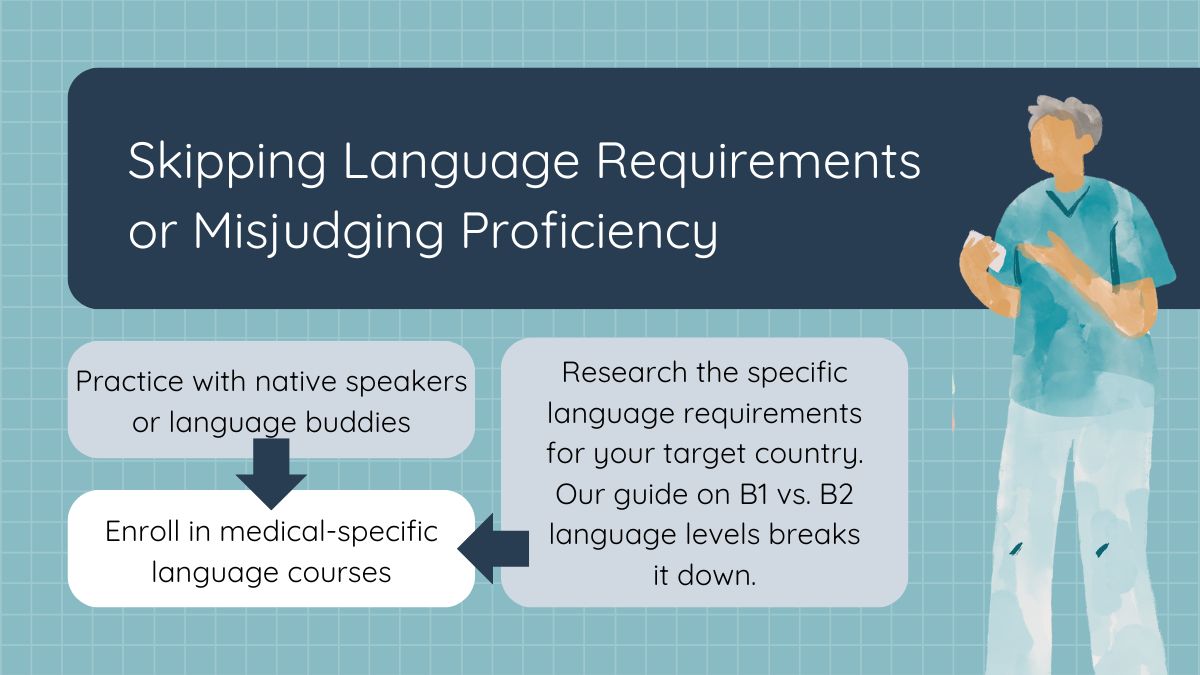
2. Not Getting Documents Anerkennung-Ready
In countries like Germany, “Anerkennung” (recognition of qualifications) is a critical step. It involves verifying that your nursing credentials meet local standards. Other countries have similar processes, like the UK’s NMC registration or Australia’s AHPRA assessment.
The Mistake: Submitting incomplete or incorrectly translated documents. Missing a single certificate or notarization can delay your application by months.
How to Avoid It:
- Start early: Gather diplomas, transcripts, and proof of work experience.
- Use certified translation services for non-English documents.
- Work with a trusted organisation like TERN, which offers pre-checks to ensure your paperwork is Anerkennung-ready.
3. Choosing the Wrong Placement Agency
Navigating international job applications is complex, and many nurses turn to placement agencies. But not all agencies are created equal.
The Mistake: Partnering with unvetted agencies that lack proper licensing or offer little post-arrival support. Some nurses go solo, only to face scams or job mismatches.
How to Avoid It:
- Vet agencies thoroughly: Check for licensing, read reviews, and ask about post-arrival services like housing or onboarding.
- Avoid agencies that demand upfront fees without clear contracts.
- Consider reputable platforms like TERN, which connects nurses with verified employers and provides end-to-end support.
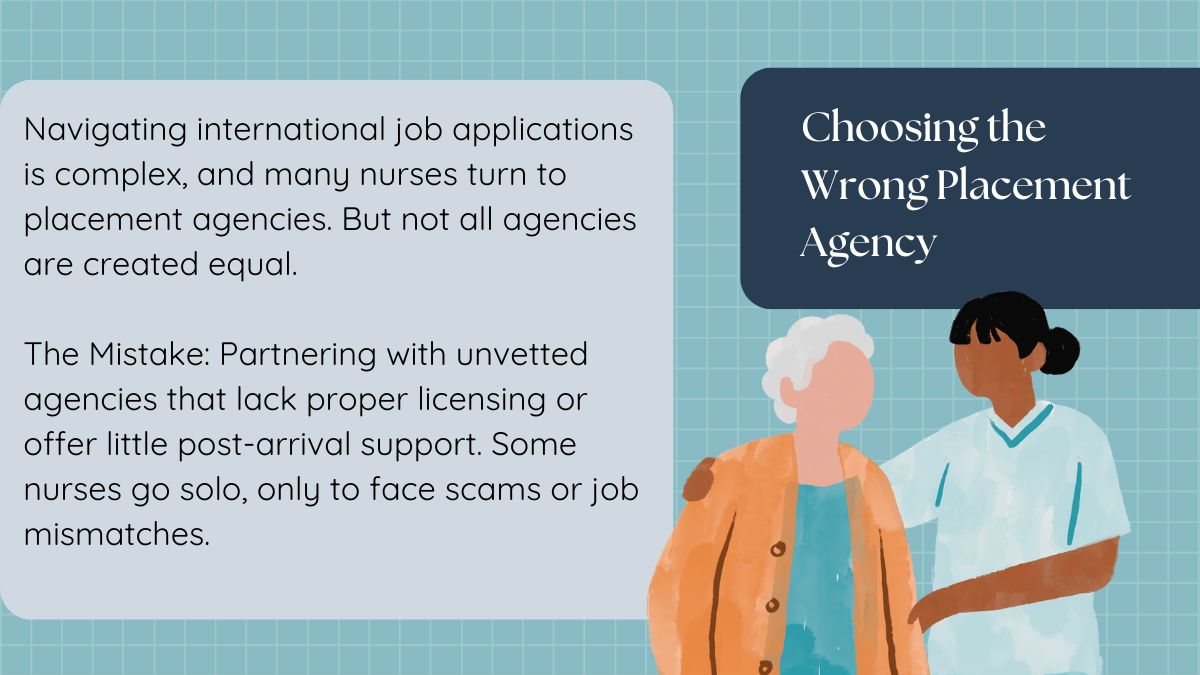
4. Focusing Only on Salary, Not Total Package
A high salary is tempting, but it’s not the full picture. Relocation packages, onboarding support, and housing assistance can make or break your experience.
The Mistake: Accepting a high-paying offer without evaluating hidden costs like visa fees, rent, or lack of relocation support.
How to Avoid It:
- Ask for a breakdown of the total package: Does it include flights, accommodation, or language training?
- Compare offers holistically. A slightly lower salary with robust support might save you thousands.
- Use tools like our relocation cost calculator to estimate expenses.
5. Ignoring Cultural & Systemic Fit
Nursing practices vary widely across countries. In some, nurses have more autonomy; in others, hierarchies are stricter. Cultural differences also affect workplace dynamics and patient care.
The Mistake: Assuming your home country’s nursing standards apply abroad, leading to burnout or conflict.
How to Avoid It:
- Research your target country’s healthcare system. For example, Germany emphasises teamwork, while the UK prioritizes patient advocacy.
- Connect with nurses already working there via forums or social media.
- Attend cultural orientation sessions offered by organisations like TERN to ease the transition.
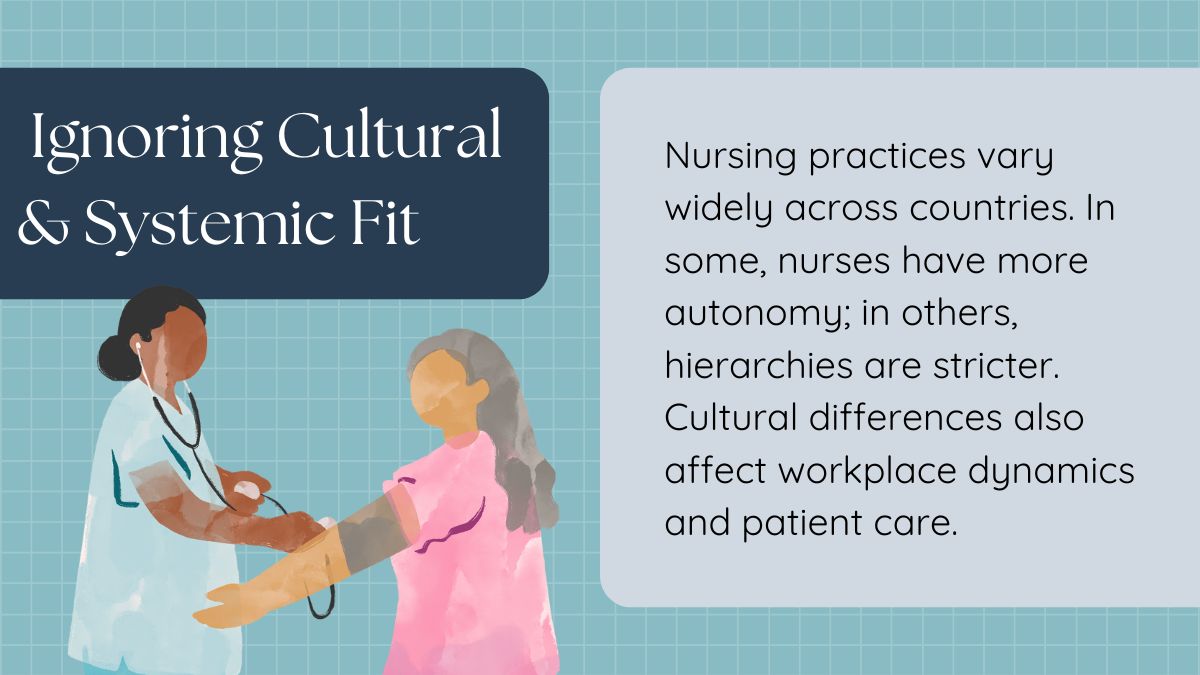
6. Not Planning for Licensing Exams or Registrations Early Enough
Many countries require nurses to pass licensing exams or re-certify their qualifications. For instance, Canada’s NCLEX-RN or the UK’s OSCE can take months to prepare for.
The Mistake: Underestimating the time needed for exam prep or registration processes, delaying your start date.
How to Avoid It:
- Map out a timeline: Research exam dates, study materials, and registration deadlines.
- Start studying early, focusing on country-specific protocols.
- Use agency support to streamline applications and avoid surprises.
7. Underestimating Emotional and Family Transitions
Moving abroad is as much an emotional journey as a professional one. Homesickness, loneliness, or family visa delays can take a toll.
The Mistake: Focusing solely on logistics and ignoring the emotional or family impact of relocation.
How to Avoid It:
- Build a support network: Join expat groups, language buddy programs, or peer communities.
- Plan for family transitions: Research spousal visas or schooling options early.
- Lean on mentors or support systems like TERN, which offer community-building resources to help you settle in.
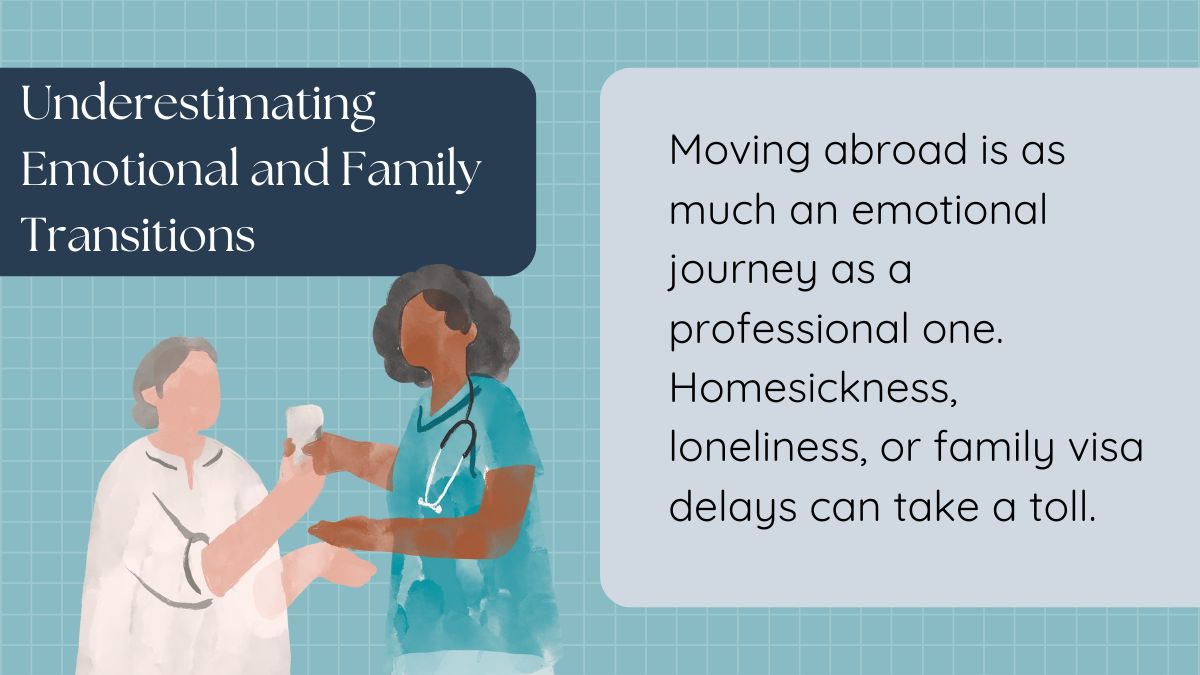
Conclusion: Prepare, Don’t Panic
Applying for nursing jobs abroad is a big step, but it doesn’t have to be overwhelming. By avoiding these seven mistakes, you’ll set yourself up for a smoother, more successful transition. From mastering language requirements to choosing the right agency, preparation is key.
If you’re ready to take the leap, we’re here to help. TERN connects nurses with verified employers, offering full document support, transparent guidance, and post-arrival resources.
Ready to take the first step?
- Contact us on WhatsApp: Message us here to start your journey.
- Sign up on our platform: Visit our AI-powered platform to create your profile and explore opportunities.
- Fill out our form: Apply now by filling your details here!
Want to join the TERN team? Check out our listed jobs here. Start your journey today — your dream job overseas is waiting.
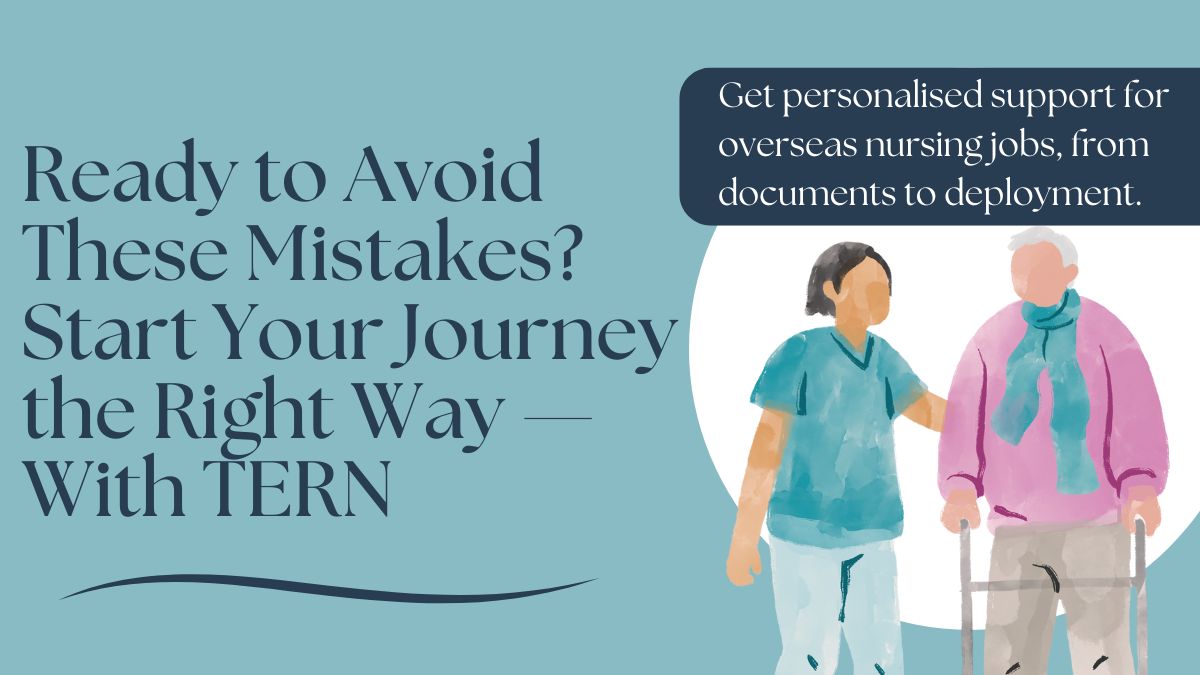





%20(1200%20x%20630%20px)_page-0001.jpg)

